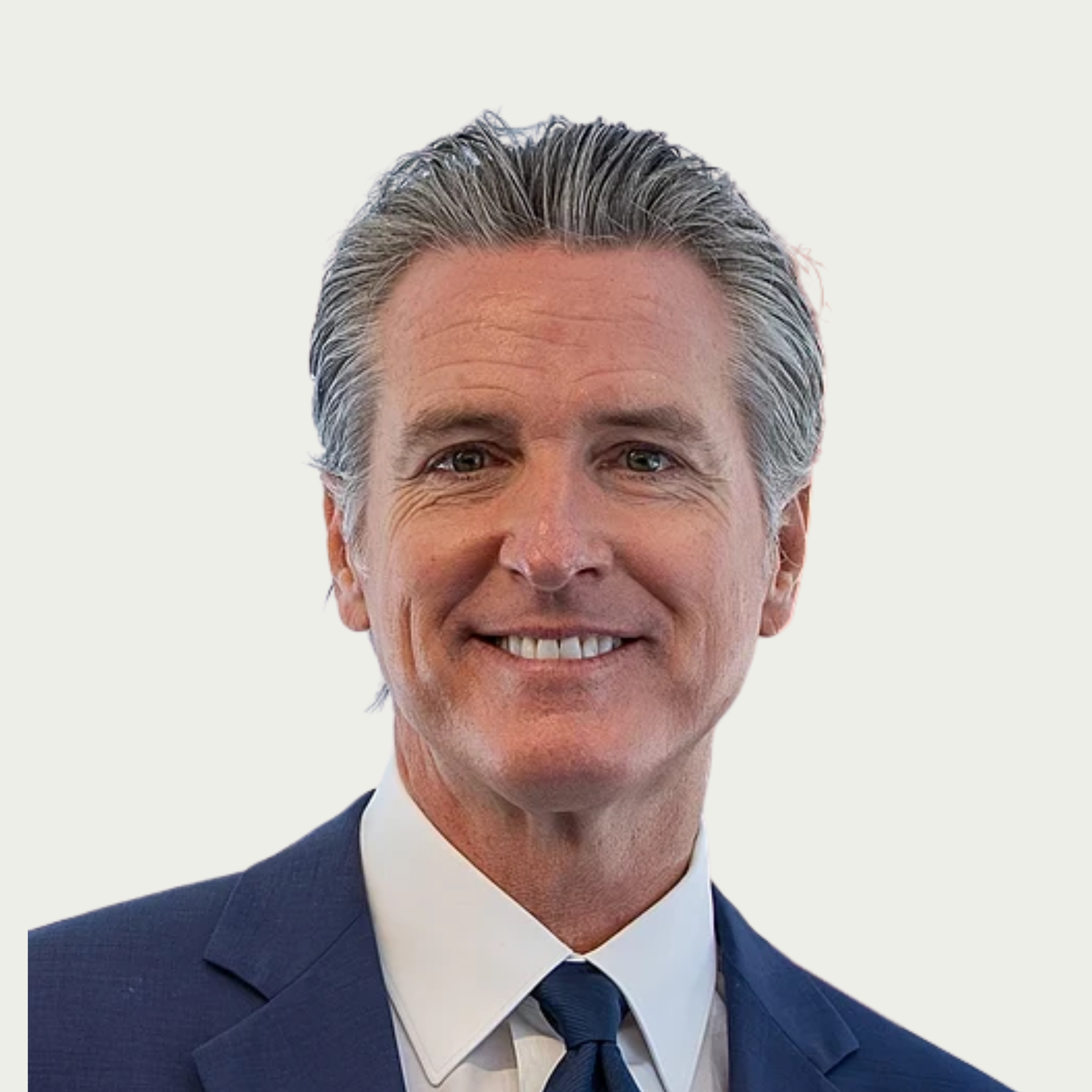327: Inside COP: Is The US Still In? And Gavin Newsom on ‘invasive species’ Trump
On Day Three of COP30, we consider the notable absence of US delegates, and ask: can a country that keeps flipping between progress and denial still claim climate leadership?
About this episode
Day three of COP30, and there’s one elephant not in the room.
While there are plenty of United States citizens at this COP, for the first time, there are no US delegates. Christiana Figueres, Tom Rivett-Carnac and Fiona McRaith consider this notable absence, and ask: can a country that keeps flipping between progress and denial still claim climate leadership?
In a conversation recorded live in the Blue Zone for America Is All In, Christiana sits down with California’s Governor Gavin Newsom, who delivers a fiery defence of his state’s climate leadership and a warning about what’s at stake for democracy itself. But with reports swirling that Donald Trump may soon greenlight new drilling off California’s coast, how does he respond?
Meanwhile, behind the scenes, the team untangles the latest intrigue over who will host COP31 - with Australia, Turkey and even Germany now in the mix - and a rather surreal rumour involving Turkey’s First Lady.
And just after the mics were packed away, protests erupted outside and inside the COP30 venue. Christiana shares her reflections on what this moment means for the summit.
Learn more:
📰 Read the latest reports that Trump is planning to allow oil and gas drilling off the California coast
📣 Find out more about the protests at the COP30 venue
🌍 Check out the official COP30 website for background and announcements
🎤 What do you want to hear on Inside COP? Ask us on SpeakPipe or on our socials where you can also see more behind the scenes moments and to watch our videos:
Instagram @outrageoptimism
LinkedIn @outrageoptimism
Or via this form.
Producer: Ben Weaver-Hincks
Edited by: Miles Martignoni
Video Producer: Caitlin Hanrahan
Exec Producer: Ellie Clifford
With thanks to Groundswell and Global Optimism.
This is a Persephonica production for Global Optimism and is part of the Acast Creator Network.
Full Transcript
Transcript generated by AI. While we aim for accuracy, errors may still occur. Please refer to the episode’s audio for the definitive version
Christiana Figueres: [00:00:00] So listeners are a wonderful production team. Was already to drop this episode for you when we heard of these protests that are ongoing at the cop venue. So we just stopped the dropping of the episode for a few minutes to bring you updated news of what is happening here on the ground. Uh, tonight, as delegates were leaving the cop venue in the evening about 6 or 7:00 at night, there were some protests that started outside on the street and then moved their way into the cop venue, and there were actually clashes between the protesters and security guards. So for the time being, we just wanted to share with our listeners that this is this is happening. It is perhaps even predictable. Um, has happened before and with, of course, with justification Vacation for the injustices that we have caused, especially to Indigenous and First Nations peoples. And I would say it is actually to the credit of the Cop presidency that they have not built a unscalable security wall around the Cop venue. Neither have they done that, nor have they had any policy to keep voices that don't agree with the process out. To the contrary, they have been very open and very inviting of all types of voices. We understand that 1 or 2 security guards were hurt in this encounter. We hope that they're all right, and we hope that this is not going to lead to any more physical confrontation. We will be covering this in more depth as the cop proceeds, and it will be very interesting to see what the impact of these protests and the very visible presence of indigenous peoples, how that is going to influence the political outcome of this cop.Tom Rivett-Carnac: [00:02:22] Hello and welcome to Inside Cop from Outrage and Optimism. I'm Tom Rivett-carnac.
Christiana Figueres: [00:02:26] I'm Christiana Figueres.
Fiona McRaith: [00:02:27] And I'm Fiona McRaith
Tom Rivett-Carnac: [00:02:28] Today we bring you a discussion on the role of the United States in the climate change negotiations. And we bring you a special conversation with Gavin Newsom, governor of California. Thanks for being here. Okay, so here we go again. Another daily episodes becoming a bit of a habit now, isn't it? I guess we should start off by delving into some of the.
Christiana Figueres: [00:02:50] Can we just say.
Christiana Figueres: [00:02:51] It's great that we're doing a daily during the Cop? Can we not do this when we go back to our normal life, because.
Fiona McRaith: [00:02:58] This is actually very intense. I know.
Tom Rivett-Carnac: [00:03:03] I think if it was in daily life, it would be like, you know, more avocado toast on the beach for Christiana. I'm not sure we'd hold our listeners with that level of detail.
Christiana Figueres: [00:03:10] The production team is basically crawling on the floor. So let's not do this to them again.
Tom Rivett-Carnac: [00:03:15] Okay. So today's episode is mainly going to be about the role of the United States in the UN climate negotiations. But we're just going to bring you is there one? Well, that's going to be the question actually. So we'll get to that.
Christiana Figueres: [00:03:26] Um, if Paul were here.
Christiana Figueres: [00:03:27] He would do. Drum roll. Drum roll.
Tom Rivett-Carnac: [00:03:30] Ben would lose it because he's touching the table. Okay. Um. Today, cop, there's been a whole there's a whole range of thematic stuff that's happening today is around food systems and extreme heat. But the conversation we want to bring you before we start is around this fight that is emerging here about who hosts the next cop, Christiana, at the end of this cop, is that right? There needs to be a decision around where it goes next. And the fight right now is between Australia and Turkey so we can get into some of those details. But anything you want to share about how cops locations get chosen?
Christiana Figueres: [00:04:01] Yeah, I think we actually did that, didn't we? We explained the five regions of the UN and that it goes in alphabetical.
Christiana Figueres: [00:04:09] Order.
Fiona McRaith: [00:04:09] And others.
Christiana Figueres: [00:04:10] And others. Is is why we're here, right in, uh, how Australia is in other to Western Europe remains to be explained by whoever invented these regions. But you know, what I think is very interesting is how rumors tend to be brought to our attention. You know, we had the rumor about the teachable F, and now I guess because people know that the podcast is very popularly listened to, they bring rumors to us.
Tom Rivett-Carnac: [00:04:40] Great isn't it? I'm really enjoying that part of it.
Tom Rivett-Carnac: [00:04:42] Yes.
Fiona McRaith: [00:04:43] So we have no doubt of that.
Tom Rivett-Carnac: [00:04:47] Open call for rumors.
Christiana Figueres: [00:04:48] There's there's such a weird.
Christiana Figueres: [00:04:50] Rumor going around about why it is so difficult for these two countries to agree.
Tom Rivett-Carnac: [00:04:58] Because two years ago it looked like Australia had it wrapped up. Yeah, and it's just gone sideways since then. So tell us the rumour you've heard.
Christiana Figueres: [00:05:04] We have heard not just me, but it has been brought to us as a rumour, um, that the First lady of Turkey is personally interested and not just interested, but really expecting quite vehemently that Turkey will host the next cup. So I'm not quite sure what to do with that.
Tom Rivett-Carnac: [00:05:26] Well, if you were if you were a Turkish negotiator and you had a direct instruction from Ermine Erdogan, do you think you would follow it? Fiona?
Fiona McRaith: [00:05:33] I would certainly do my darndest. Yeah. Yeah.
Tom Rivett-Carnac: [00:05:35] I think it would be a little frightening not to follow that instruction, wouldn't it?
Fiona McRaith: [00:05:38] Yeah, I mean, I don't I don't know her, um, personality, disposition, but yeah, I would probably try my best.
Christiana Figueres: [00:05:46] And rumour. I mean, shall we complete the room?
Tom Rivett-Carnac: [00:05:48] Go on then.
Tom Rivett-Carnac: [00:05:48] Yeah.
Christiana Figueres: [00:05:49] So, um, rumour also has it that, um, Australia even offered to continue this tradition of splitting up the leaders summit from the cop itself? No, with the distinction that here in Brazil, it took place in the same city, uh, although separated by two days of a weekend.
Tom Rivett-Carnac: [00:06:13] But.
Christiana Figueres: [00:06:14] Apparently Australia. So once the cop that they have offered to Turkey to host the leaders summit at some undefined date in Turkey and then the cop in Australia.
Tom Rivett-Carnac: [00:06:29] Let's hope that doesn't happen.
Tom Rivett-Carnac: [00:06:31] What do you.
Fiona McRaith: [00:06:31] Make of that?
Christiana Figueres: [00:06:32] I mean, well, very strange. Now, innovation should never be squelched because we've never done this before.
Tom Rivett-Carnac: [00:06:40] Splitting a conference.
Tom Rivett-Carnac: [00:06:41] Between 9000 miles, I think possibly should be squelched.
Tom Rivett-Carnac: [00:06:44] Well.
Tom Rivett-Carnac: [00:06:46] You're up for it.
Christiana Figueres: [00:06:47] I mean.
Christiana Figueres: [00:06:47] Honestly, if it leads to a solution, if it leads to an agreement, then then if that is the only agreement. But what we hear is that that has not been accepted.
Tom Rivett-Carnac: [00:06:59] So if you were betting people, would you put your money on on Turkey, Australia or Bonn at this point?
Christiana Figueres: [00:07:07] Yeah. And that is the piece that we haven't explained that if two countries that are in the same region of the UN cannot agree with each other about where it goes, then the region as a whole cannot formally put forward its candidate host country. And then by default, it goes to where the secretariat is located, which is in Bonn, Germany.
Tom Rivett-Carnac: [00:07:29] So which.
Tom Rivett-Carnac: [00:07:29] Direction?
Christiana Figueres: [00:07:30] And that does not solve? No, but here's the thing. It does not solve the issue of who presides, because they still have to have a country in charge, so they still have to agree whether it would be Australia or Turkey.
Fiona McRaith: [00:07:44] There are times when compromise makes a lot of sense. I do not think if you look at what cops need to deliver that splitting up the World Leaders Summit by 9000 miles and two countries is going to deliver the clarity and interconnection that is needed between high level segment of world leaders and the Cop. And I think we even see that a little bit of just two days separation on the ground in Belgium.
Tom Rivett-Carnac: [00:08:10] Okay. So we don't know where it's going to go. Christiana's not making a bet.
Fiona McRaith: [00:08:14] I'll make a bet.
Tom Rivett-Carnac: [00:08:14] You'll make a bet. What do you.
Fiona McRaith: [00:08:15] Think? Well, um, maybe I don't want to make a bet on air. Um, but I would love. I think my my personal vote would be. Especially because it's not just Australia. It would be the Pacific islands, the South Pacific islands. And I think that would be a really to bring in that region in that way. You know, we heard from Christiana on the concept of the VAR recently on the podcast. And I just think that that type of mindset would be a really special thing to bring into the cop.
Tom Rivett-Carnac: [00:08:42] I totally agree with that. It's also worth, in the spirit of like two things being true at the same time as Australia's. Also, don't forget the world's largest exporter of coal. It's a pretty complicated in terms of their role with climate change. Now then, shall we move on and talk about the main issue that we wanted to discuss today, which is the role of the United States?
Tom Rivett-Carnac: [00:08:58] Yes. But can I just.
Christiana Figueres: [00:08:59] Ask one question before we do that, let us conceive of a scenario in which they don't agree on which city will host. But, um, it does go to button. And would the Pacific spirit be present in Bonn if it is under the Australian presidency? Fee?
Fiona McRaith: [00:09:22] I think reflecting back on the brilliant interview yesterday with the president of the COP, I think it really depends on who holds those positions and how they invite in other voices. What do you think?
Christiana Figueres: [00:09:35] I think that is a very good answer. Thank you.
Fiona McRaith: [00:09:40] It's also worth noting, sorry, that neither head of state from either country was here right during the world Leaders segment.
Tom Rivett-Carnac: [00:09:47] Absolutely right. And the thing I would add on to what you just asked is that when Fiji were presiding and it was in Bonn, I don't know if that spirit really infused it in the way that it would have done if it had been in Fiji. There's something about being in these these locations, I think that makes it feel different. So anyway, one of my favorite moments yesterday was when the roof broke in the cop and water poured down in the middle of a rainstorm on a poor panel in a country pavilion. Let's hope we don't see more of that in the coming days. I think they're trying to fix it. But seriously, the fact that any tented roof can survive this rain is pretty impressive.
Christiana Figueres: [00:10:20] It really is. Serious tropical rain. Here we are in the tropics. Let's expect tropical rainstorms.
Tom Rivett-Carnac: [00:10:27] Now, I have another quote for you to try and identify who said it. I know, I know, I'm so sorry. Do you want it in my Al Pacino accent?
Fiona McRaith: [00:10:35] Definitely yes.
Tom Rivett-Carnac: [00:10:37] Because it is. The only guidance you have. Is it is someone from the United States okay?
Christiana Figueres: [00:10:43] Someone.
Tom Rivett-Carnac: [00:10:43] Someone. And you're trying to tell me who it is?
Tom Rivett-Carnac: [00:10:45] Oh, gosh.
Tom Rivett-Carnac: [00:10:46] A leadership person. Okay, I come here with an action plan on climate. It commits us to energy efficiency, clean air, reforestation and new technology. I propose that all countries join us and set out national plans with specific commitments and defined timeframes. Let us join in translating the words spoken here into concrete action plans to protect our planet.
Christiana Figueres: [00:11:14] Is it Gavin?
Tom Rivett-Carnac: [00:11:15] Nope. Oh, no.
Christiana Figueres: [00:11:18] Who is it?
Speaker6: [00:11:20] Wait wait wait wait.
Fiona McRaith: [00:11:22] Is this from this cop?
Tom Rivett-Carnac: [00:11:23] Nope. This is from us. Leadership of some kind on climate.
Fiona McRaith: [00:11:29] Podesta.
Tom Rivett-Carnac: [00:11:30] No. There's one more sentence that will reveal it to you.
Christiana Figueres: [00:11:33] Oh, no. Okay.
Tom Rivett-Carnac: [00:11:35] I am pleased to announce that I have just signed the United Nations Framework Convention on Climate Change.
Christiana Figueres: [00:11:41] Woo hoo!
Tom Rivett-Carnac: [00:11:44] So this is George Bush senior in 1992, as the US entered the global effort to deal with climate change. Since then, the US has played a central role in negotiating the Kyoto Protocol and then failed to ratify it and then announced it would not implement it. It's played a pivotal role in negotiating Paris and then two years later, withdrew. Four years after that, it rejoined and submitted a new national plan and passed laws to enable that. Three years later, it withdrew and announced it would not try and meet their targets, and has now adopted aggressive lobbying tactics to prevent anyone making further progress. So. Load More
Tom Rivett-Carnac: [00:12:24] Wars.
Tom Rivett-Carnac: [00:12:25] We say Australia. Yeah. And so far here zero US delegates have arrived. So the US is the only country to behave like this. So my question is the US is not here at the moment. We're going to talk to Gavin Newsom. Does it matter if they go back to leadership because they're completely inconsistent and the rest of the world can't rely on US leadership.
Christiana Figueres: [00:12:44] Doesn't that answer the question?
Tom Rivett-Carnac: [00:12:45] Well, I mean, no, because that. Tell us what that on again off again mode does in the international attempts to deal with climate. Is it of any use because we get all excited when we go one direction, then all depressed when we go the other, then all excited again. What? Just talk through the dynamics around how that affects everyone else's attempts.
Christiana Figueres: [00:13:07] I think there are at least two parts to that question. One is, does it affect emission reductions? Does it affect the numbers, the tons that are being reduced? Um, because ultimately that's what we need. So I would argue that it delays and does not ultimately reduce the number of tons that are being reduced because the US will catch up eventually, hopefully in my lifetime. So that's one question. The delay in emission reductions. The other question that I think is actually more interesting and more nuanced is what is the fallout, the political fallout of this immature behavior of the United States? Because honestly, when you read it like that, I just, you know, think of a two year old that doesn't know what, you know, whether they're coming and going that throws tantrums and then stands up, has a great laugh and then throws another tantrum. I mean, it's just it is so immature. It is so inconsistent and and very difficult for the private sector to have any continuity and certainty and policy for sure internally but internationally. Does it not degrade the credibility of the United States, even in those times in which they're doing their job?
Tom Rivett-Carnac: [00:14:35] Yeah.
Fiona McRaith: [00:14:36] Yeah. I think it may have had more of an impact in the past, looking back because the case was being made and being built. But actually, businesses are still committed to this, whether or not the US is leading it. Would U.S. leadership and all the IRA policies that the Biden administration had put in that are going away at the end of this year, going to slow down progress? Definitely. But businesses are still committed. They're still doing it, even if they're headquartered in the United States. They have a lot more to wade through. And I think now we're seeing the center of gravity or the anchor points also be in countries like China, like India. And I just think the US is is, um, totally because of this whiplash is losing a really anchoring point in what the future is. And but I think it will be less consequential. Um, I do think it erodes their ability to engage and trust And not to mention that the Trump administration has eradicated a lot of the agencies and jobs that would be able to lift this back up when.
Tom Rivett-Carnac: [00:15:46] The underlying science.
Fiona McRaith: [00:15:47] Right, like the EPA, State Department, USAID, gutted of all of the environmental professionals who were experts in this space. So even if you have an administration.
Christiana Figueres: [00:15:58] Magically disappearing from all websites.
Fiona McRaith: [00:16:00] Yeah. If there were a new administration that was equally committed and came back into Paris, there's also rumors of the Trump administration pulling out of the UNF triple C overall, which would have different ramifications politically. But it's not just kind of an on off switch, it's capacity that isn't there anymore. And, you know, I don't I highly doubt that.
Tom Rivett-Carnac: [00:16:20] That.
Christiana Figueres: [00:16:20] Can be rebuilt. But we would need to be rebuilt.
Fiona McRaith: [00:16:23] And would take time. Yeah.
Tom Rivett-Carnac: [00:16:25] Yeah. I mean and you we're going to go up to the blue zone in a, in a few minutes. And Christiana, you're going to be on stage with the governor of California. And you get a chance to ask him about his leadership. And of course, he's really pushing his credentials down here as almost the sort of, you know, government in waiting because clearly he wants to run for president and he is trialing those credentials on the world stage here. Um, it's interesting because looking at that list and by the way, the fact that the original quote I read was from a Republican president 33 years ago, and we're nowhere near that bipartisanship. Now, the interesting question to me is less, are we going to win on the Democratic side to let the pendulum continue to do the ding dong and swing back the other side? But how do we get past this? And how do we get to a point where we can actually have a platform to move forward and do what is economically rational, environmentally sensible and socially beneficial? So I think that would be an interesting way for you to take that conversation.
Christiana Figueres: [00:17:19] Well thank you. Are you giving me my speaking points.
Tom Rivett-Carnac: [00:17:21] For the conversation?
Tom Rivett-Carnac: [00:17:22] I only ever submit suggestions and then we'll see.
Tom Rivett-Carnac: [00:17:28] No, but that is.
Christiana Figueres: [00:17:29] The.
Christiana Figueres: [00:17:29] Question, right?
Christiana Figueres: [00:17:30] That is the question. Um, and I will be very interested to see his take on that, and whether his very evident, loud and virulent disdain, uh, for, uh, for Donald Trump, um, can actually allow him to look at a challenge like this in an objective way? Or is his disdain just making him completely blind to an opportunity?
Tom Rivett-Carnac: [00:17:57] Are you going to ask him some cheeky questions?
Christiana Figueres: [00:17:59] Of course.
Tom Rivett-Carnac: [00:18:00] You can tell us what.
Tom Rivett-Carnac: [00:18:01] They are.
Christiana Figueres: [00:18:01] No.
Tom Rivett-Carnac: [00:18:01] Okay, great. All right, well, I think that probably we should make our way across Belgium and, uh, and then, so the next thing listeners will hear will be Christiana on stage with Governor Newsom, and then we'll try and do a bit of a wrap up as we make our way back across town after.
Christiana Figueres: [00:18:16] We'd better not be late.
Tom Rivett-Carnac: [00:18:17] We better not be late. Let's go.
Gavin Newsom: [00:18:23] Good to be with you. Thank you. How are you?
Christiana Figueres: [00:18:26] I am very well. We were chatting with all the audience while you were doing many other things. You have mostly US citizens.
Gavin Newsom: [00:18:37] No one booed. That's good.
Christiana Figueres: [00:18:40] So we've actually been gathering about 137 questions for you. Um, the problem is that you only have time for a few. So. Okay, the first one that I have promised is what the headline is today. Someone whose letters are in DDT because it's difficult for me to even pronounce, has actually said that he would love to open the California coastline to oil and gas drilling. Now, before you start, I know that you want to be diplomatic. I know that you would like to miss you.
Gavin Newsom: [00:19:18] Yes, I'm known for my diplomacy.
Christiana Figueres: [00:19:21] But we would really like to know.
Gavin Newsom: [00:19:23] Yeah. Over our dead body. Period. Full stop. And you know what's interesting about that? Says he wants to open up the coast of California oil drilling, but he has no interest in opening up oil drilling rigs right off the coast of Florida, not right across the street from Mar a Lago. Completely silent on that. So it's never going to happen over our dead body. It's dead on arrival. Period. Full stop. And I say this very mindful. Uh. Look, I do not want the United States of America to be a footnote on climate policy. And that's exactly what Donald Trump is intending to do. He's intimidating and bullying people. He's threatening people. You saw it with the with what we did on the the world shipping deal we had. They were another side of it. This is a different time, requires a different kind of politics, requires a different kind of clarity, different kind of conviction. You got to call things out. You can't play by the old set of rules. When it comes to Donald Trump and Trumpism. We have simultaneous crisis. We have a a global climate crisis and a crisis with democracy. Donald Trump does not believe in the rule of law. He believes in the rule of dawn. And I hope it's dawning on you and others around the world what is going on in the United States of America.
Gavin Newsom: [00:20:44] And so my state of mind is very different than it was nine months ago. And I'm deeply mindful of the anxiety that many of us fear around the globe. But I'm not going to be complicit, and nor should you be complicit at this moment. It requires people of conviction, of authenticity to share their voice and to stand up to this bully. He's an invasive species. He is. He's a wrecking ball president, and he's trying to roll back progress the last century. He wants to recreate the 19th century. He's doubling down on stupid as he tries to vandalize our progress. And you know who's cheering him? Sheringham, who's singing his praises. President XI and China. They're sitting back, dominating supply chains, dominating manufacturing, flooding the zone all across this country because they understand the great economic opportunity to transition to clean and green energy. And we will not allow that to happen in the state of California. We are a stable partner. We are a reliable partner. Trump is temporary, and California will continue to lead the national conversation in the United States of America. On the issue. That brings us all here to Belgium today.
Christiana Figueres: [00:22:10] Okay, so let me ask you a question about democracy, because the fruit of democracy is that we have changing administrations, which is in principle a good thing. With climate you need actually consistency and predictability. So how do we bring those two things together, especially for a country that has honestly flip flopped as often as the United States? The United States went into the Kyoto Protocol, then came out of the protocol. It went into the first part of the Paris Agreement, then came out. It went back into the Paris Agreement. Now it is out. This is a multilateral scenario here. This is a multilateral forum. How do other countries even conceive of the United States as a reliable, consistent partner? It's the United States has flip flopped so much.
Gavin Newsom: [00:23:04] Please don't look at the United States from the prism of Washington, D.C. think about the United States bottom up, not top down. We have a system of federalism. Our founding fathers, 249 years ago, took the best of the Roman Republic, took the best of Greek democracy, co-equal branches of government, popular sovereignty, that rule of law The 10th amendment of the Constitution gives states certain rights and the State of California. Since Ronald Reagan 1967, Governor Ronald Reagan has been leading in a bipartisan way, passing the baton regardless of change of administration with a consistent policy of low carbon green growth. We created the California Air Resources Board in 1967. In 1970, a Republican by the name of Richard Nixon gave us a waiver codifying our national leadership. Democrats and Republicans understand the economic imperative seven times more green jobs in California than fossil fuel jobs. We're now the fourth largest economy in the world. Not despite that, because of our policies. Elon Musk may be a trillionaire. Because of California's regulatory system, there would be no Tesla without the consistent regulatory posture from the state of California. So my point to you is to make a point to all of you that we believe is a model, the power of emulation. Success leaves clues.
Gavin Newsom: [00:24:42] And that consistency we just reinforce. Just a week ago, before we came here, we extended our cap and trade nation leading cap and invest program to 2045. That marks the market. So whatever happens in Washington DC, it's a lot of noise. I'm not naive. But go local. Amazing things are happening at the local level all across the United States of America. What America all in represents is that recognition. You don't like the way the world up. When you're standing up, stand on your head and go. Local cities, counties, Republican led cities and counties, and blue and red states are moving forward because they believe that climate risk is economic risk, and they want to de-risk. They want to future proof. And they understand that green energy is low cost energy. It cost of living is the biggest driver of so much of the populism in our country and for that matter, around the world, and they're increasingly seeing the economic imperative and opportunity. So our mindset is local and subnational. And I hope when you think about the United States, don't think about what happens every four years in relationship to DC. Think about how you can engage and partner with states like California and other states across our country.
Christiana Figueres: [00:26:16] Good advice for those in the audience. But sitting next to me is someone who wants to go national.
Gavin Newsom: [00:26:21] Well, I don't I don't want to go anywhere. I want to go to the Amazon, actually, in two days. So point me in the right direction.
Christiana Figueres: [00:26:29] Well, it seems to many of us here that you are pointing perhaps in the right direction. So let's just fast forward in our imagination. We're not saying anything here that is factual. This is not a fact check. This is just imagination. Let us imagine that you are the candidate for the presidency of the United States, that you will run on a pro-climate campaign. Once you're elected in the white House, you might have to de-politicize climate change in order to drive the policies that you need to catch up with the rest of the world, who's going to be way ahead of the United States? So how do you run a climate campaign and then depoliticize across the aisle?
Gavin Newsom: [00:27:20] I'm not going to take the bait. But I will say this. I think we need to change the debate when we talk about 1.5 in the United States. No one knows what. With all due respect, I have a tough time as well. Fahrenheit or Celsius? And what's 1.5 Fahrenheit? And you translate to Celsius greenhouse gas. It's abstract. Climate change seems abstract. So we have to talk in terms that people understand. And I say this all the time you don't have to believe in science. You have to believe your own eyes. It's about people. It's about places. It's about lifestyles. It's about traditions. I come from a state that's one of the most blessed and cursed states. We're in the tip of the spear as it relates to the impacts of climate change. Remember in Los Angeles, California, in the middle of winter in January, we had one of the most devastating wildfires in US history. Simultaneous floods and droughts. Places wiped off the map. Paradise, California, where I walked with Donald Trump seven years ago. Six years ago. Grizzly flats wiped off the map. And I think we talk in those terms. Pollution blanket. Not an abstract. People can absorb those metaphors and they can understand what this is. I talk about financial risk in relationship to climate risk. I talk about the insurance crisis in the United States of America. And you can't build a home, let alone buy a home without insurance. That connects all of us to this issue. The cost of energy going up because Donald Trump has pulled away from Joe Biden's climate leadership, they anticipate 10% increase in energy costs this year alone because of Donald Trump's vandalism of Bidens. So if we put things in those terms, I think we can start bringing people over and we can create the space where we can start to win. This imperative is important debate.
Christiana Figueres: [00:29:29] Thank you. So sadly, we have to let you go because you have a very pressed agenda. I'm going to do a rapid fire. I'm going to give you four words.
Gavin Newsom: [00:29:37] This is boxer and brief time.
Christiana Figueres: [00:29:39] And you just tell me the one thing that comes up in your mind.
Gavin Newsom: [00:29:44] Oh, geez.
Christiana Figueres: [00:29:44] Fly fishing.
Gavin Newsom: [00:29:46] Oh, my. This is.
Gavin Newsom: [00:29:48] Look at me. I'm about to tear up fly fishing. I mean, it's like my life for you. It may be dancing. For me. It's fly fishing.
Christiana Figueres: [00:29:55] All right. Yeah.
Gavin Newsom: [00:29:57] I got I we got married. My daughter's name is Montana. I got married in Montana. Uh, if I disappear, you'll find me in Montana. Fly fishing.
Christiana Figueres: [00:30:07] Botswana.
Gavin Newsom: [00:30:09] What's that?
Christiana Figueres: [00:30:09] Botswana.
Gavin Newsom: [00:30:10] Oh, Botswana. I went on my honeymoon. Where did you get this? I went on my honeymoon in Botswana. And, uh. By the way, my name is Gavin. I was named after someone, uh, that wrote a book on river otters, Gavin Maxwell, which was my first pet. So you can understand why my brain is wired a little differently, perhaps, than some other American politicians. So when it comes to wildlife biodiversity, when it comes to nature, uh, that was my connection. Not just to my creator. Well, figuratively, but my creator. Literally. My father. Um, he got divorced at a very young age, but my one connection with him was once a year on a vacation. Um, talking about the Tsongas, uh, wilderness. Talking about Klamath River, uh, talking about, uh, the imperative of having a sense of purpose and responsibility. So you can have meaning in your life and being a good steward of our planet.
Christiana Figueres: [00:31:11] 41 cases.
Gavin Newsom: [00:31:13] Well, we're at 46 right now. I'm just saying those are lawsuits against the Trump administration, so we are not screwing around. There's been 41 weeks of the Trump administration, and we're at 46 lawsuits, by the way. I'm not not one of those. We proactively filed all of them are in reaction to this unprecedented assault on progress, our republic, my state and our state of mind as it relates to the environment. His first term, 122 lawsuits, over 80% of them were in the environmental space. He is not screwing around. He's surgical in terms of approach. We opened up about offshore oil drilling. That's sacrosanct. It's universally opposed. Yet he still is proposing it. He's a different person. It's a different time. And I hope people understand. But things to change. We need to change in order to meet this moment. Small.
Christiana Figueres: [00:32:15] The last question and the most difficult of the day. Are you ready?
Gavin Newsom: [00:32:18] What is it?
Christiana Figueres: [00:32:19] One positive word about Donald Trump.
Gavin Newsom: [00:32:24] Well. I mean, you say word, and it's hard to come up with a word.
Christiana Figueres: [00:32:30] Just one word.
Gavin Newsom: [00:32:31] Just one. I think one of his great strengths, and it will end on a word, is his ability to shapeshift, his ability to dominate. He doesn't care if he's the heel or the hero as long as it's a star. His ability to take mindshare to dominate the narrative. He's one of the most effective communicators in my lifetime, one of the worst orators, but an unbelievably effective communicator. And any of you that may have 1 or 2 of you seen some of my social media? I've tried to put a mirror up to the way he communicates and how he communicates, And it matters. Narrative matters. Narrative on climate change matters. Narrative in terms of mindshare. People, we need attention. This issue needs attention. I'm here for attention. Actually the opposite. I'm trying to stay out of the media in the United States, but I'm here to garner attention on this issue. So it's not lost in the United States. Again, is not a footnote at Cop 30. Thank you guys very, very much.
Christiana Figueres: [00:33:43] Thank you.
Tom Rivett-Carnac: [00:33:44] Tom. Thank you. Thank you.
Tom Rivett-Carnac: [00:33:50] Okay. So this is a this is a classic cop experience with Cristiana. It's impossible to move more than ten yards.
Fiona McRaith: [00:33:56] Send us, like, energetic vibes.
Tom Rivett-Carnac: [00:33:59] Yeah. Fiona has the job of trying to tear her away from the former president of Costa Rica. And of course, they just keep chatting. So anyway, I think we're on the move again now. Oh, no we're not. She's been stopped again. I mean, I feel like I get stopped by a lot of people in Cop, but this is absolutely out of sight. Um, okay. I think we're getting somewhere towards the exit. Okay, so we have just left the on stage interview we did with Gavin Newsom. We finally made it out of the cop. Ben gave me the best possible description of what it's like walking around the cop with you. He said it's like being in a supermarket with a toddler keeps being distracted by all sorts of things. But it's only taken us an hour to travel those 50 yards because everyone wants to talk to you. But anyway, we're outside now. What did you think of that discussion you had with the governor?
Christiana Figueres: [00:34:39] Obviously, he knows this topic among many others, and he is deeply steeped. But what is comforting to me is that he's not making a moral argument. He's making an economic imperative argument, which you really wonder why the United States as a whole doesn't see the advantages in that. But he has that very clear.
Tom Rivett-Carnac: [00:35:04] Absolutely.
Christiana Figueres: [00:35:05] And and so to my question about how do you depolarize the conversation in the United States. That is the way. That's the only way to do it, to step out of the ideology and make it very clear that this is the way the world is moving toward a profitable, healthy, more and more just economy. What is there not to like about that?
Tom Rivett-Carnac: [00:35:31] I mean, the narrative, I think is 100% right. I worry that he himself has already become such a divisive figure, not to his own fault, but given the way politics is in the US, that any time he opens his mouth, half the country feel like they already know what's going to come out of it. So if he does want to form a bipartisan consensus around the issues you talk about around economic opportunity, he's going to have to find really creative ways to bring other voices in to do that.
Christiana Figueres: [00:35:56] And so there are two points there, right during his campaign or in or in an eventual presidency.
Tom Rivett-Carnac: [00:36:05] Yeah.
Christiana Figueres: [00:36:05] No I'm asking.
Tom Rivett-Carnac: [00:36:06] Oh I see. Well, in the campaign I think is to get the vote out strategy. It's to mobilize the base, get everyone there, move beyond Trump. But once in office, if.
Tom Rivett-Carnac: [00:36:15] He.
Christiana Figueres: [00:36:16] Mobilized everyone who's outraged.
Tom Rivett-Carnac: [00:36:17] Okay. So that's that's good. That's enough. We'll take that if he gets in office. But beyond that, if he does end up in the white House and he genuinely wants to do what he talked about there, which is build a bipartisan consensus, he's going to have to get people talking about this across all levels of society, because he himself can only do so much.
Christiana Figueres: [00:36:35] Because he has painted himself into one corner so clearly.
Tom Rivett-Carnac: [00:36:38] Yeah, exactly. But anyway, great conversation. Glad we made it out of Cop Alive. And now we've now we've got to find our way to the edge of this perimeter and try and get all the way downtown for the next thing, which I think is also with Gavin Newsom.
Christiana Figueres: [00:36:48] It is also Gavin Newsom.
Tom Rivett-Carnac: [00:36:50] All right, let's try and do it. So thanks for listening, everyone. We're going to try and find an Uber and get downtown. We will be back tomorrow with our daily episode. Appreciate you joining us.
Christiana Figueres: [00:36:59] Talk to you tomorrow.
Your hosts

Christiana Figueres
 Follow Christiana Figueres on Instagram
Follow Christiana Figueres on Instagram

Tom Rivett-Carnac
 Follow Tom Rivett-Carnac on Instagram
Follow Tom Rivett-Carnac on Instagram
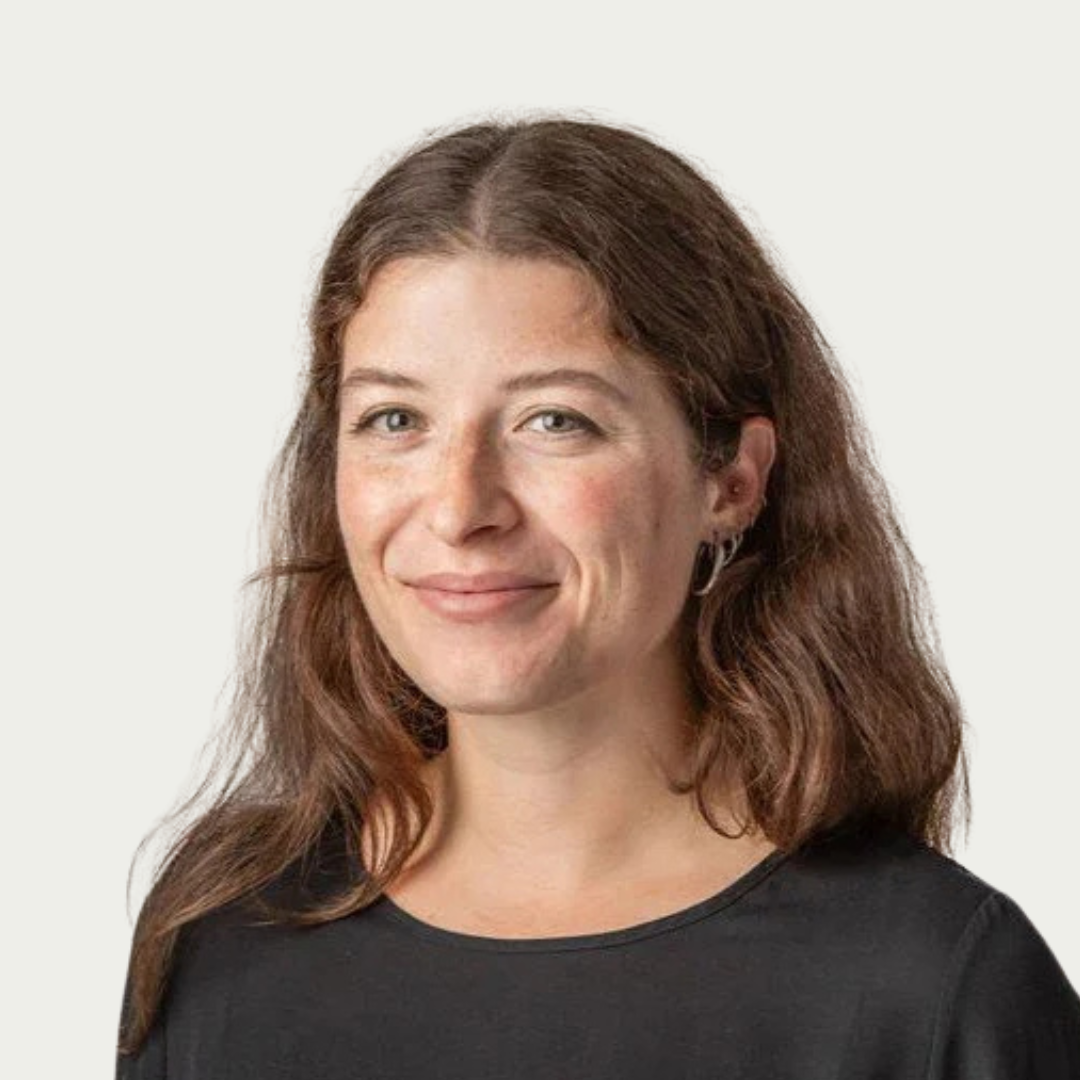

.png)
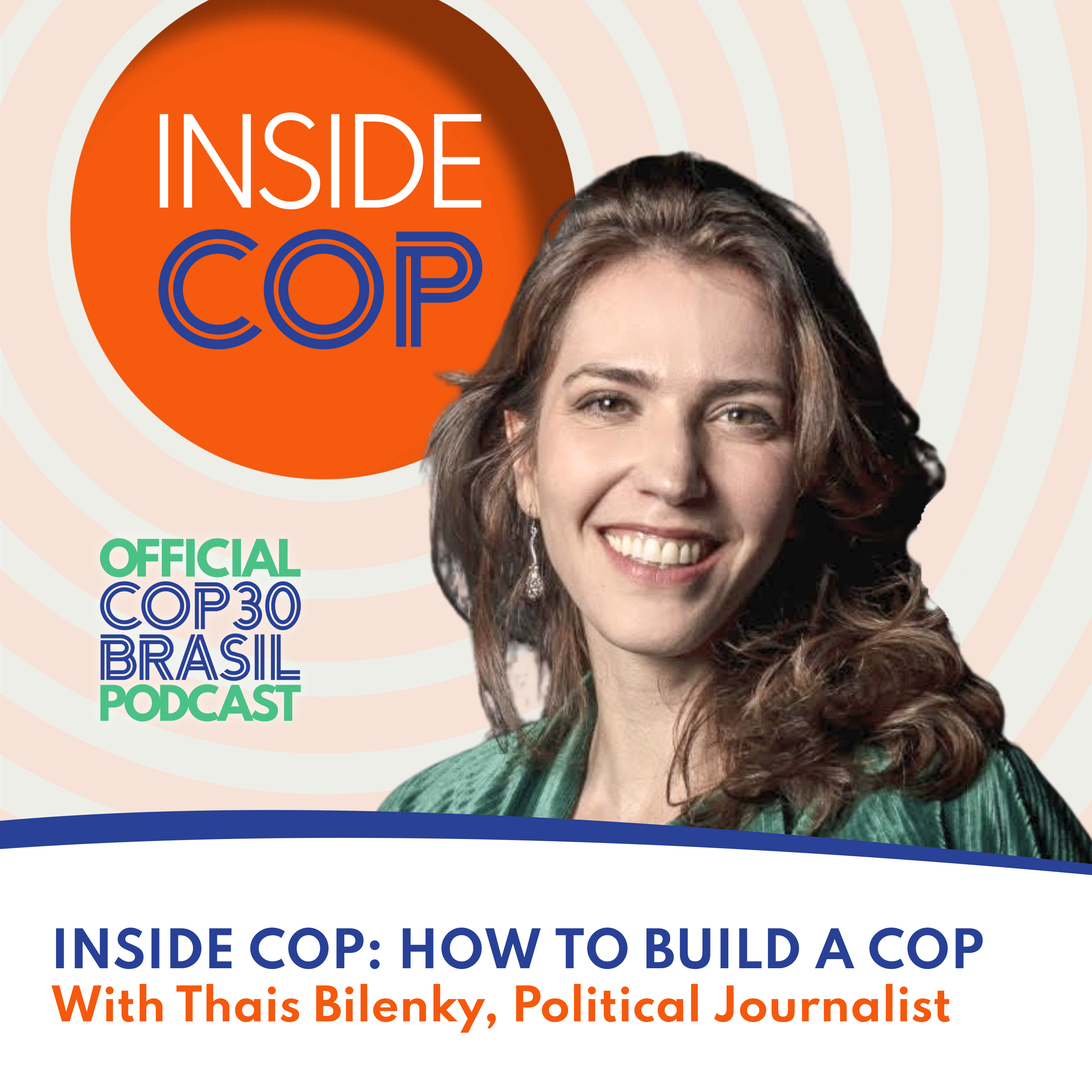
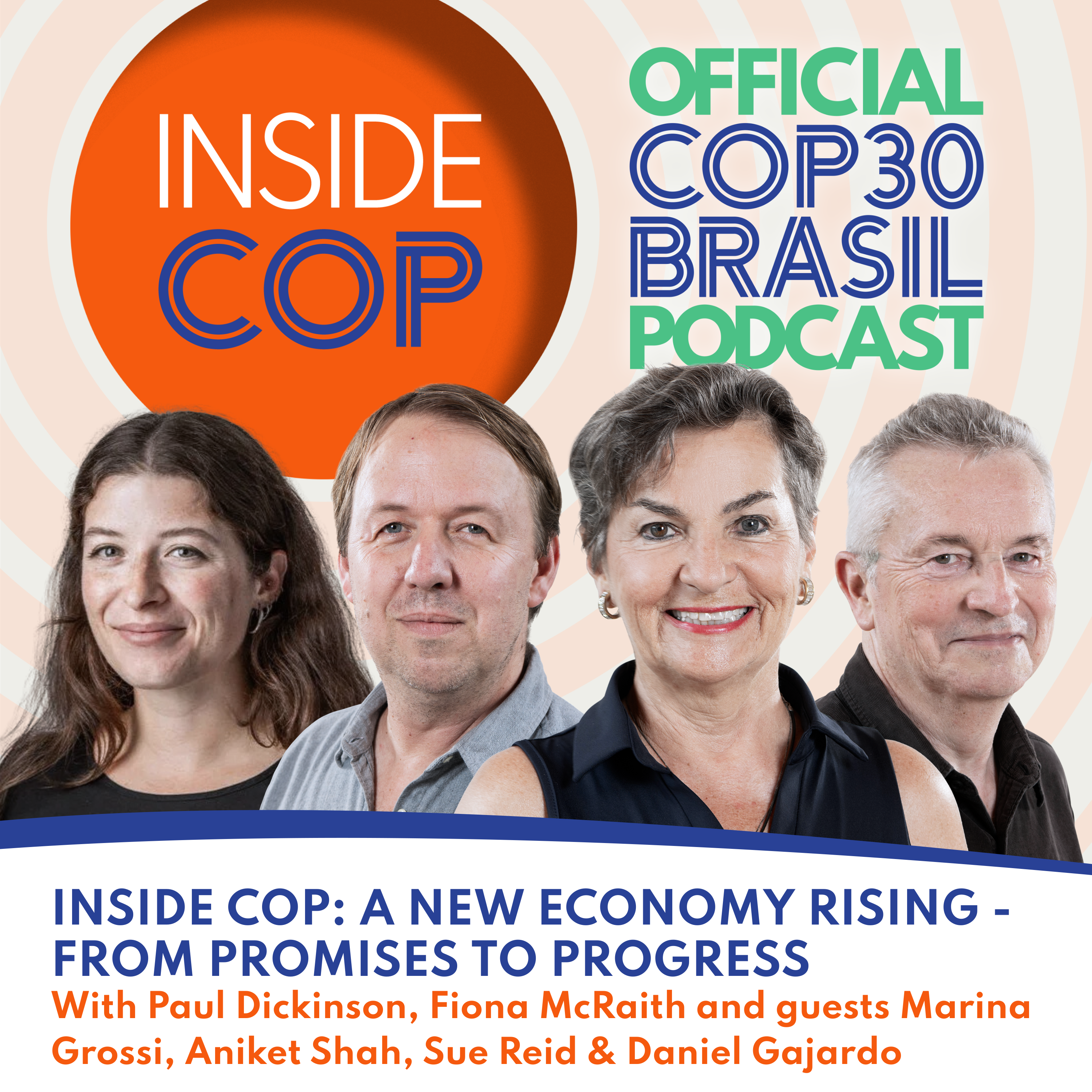
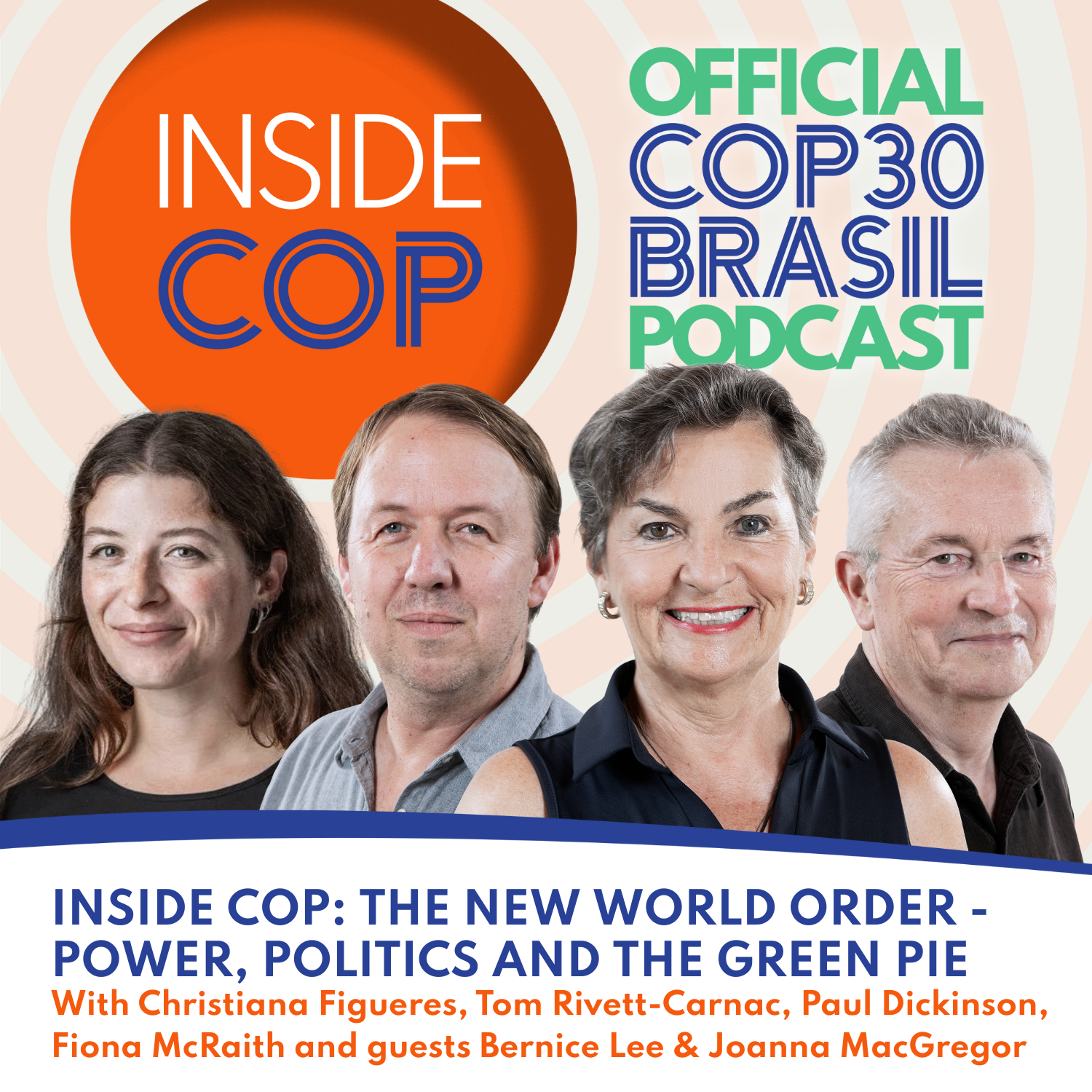
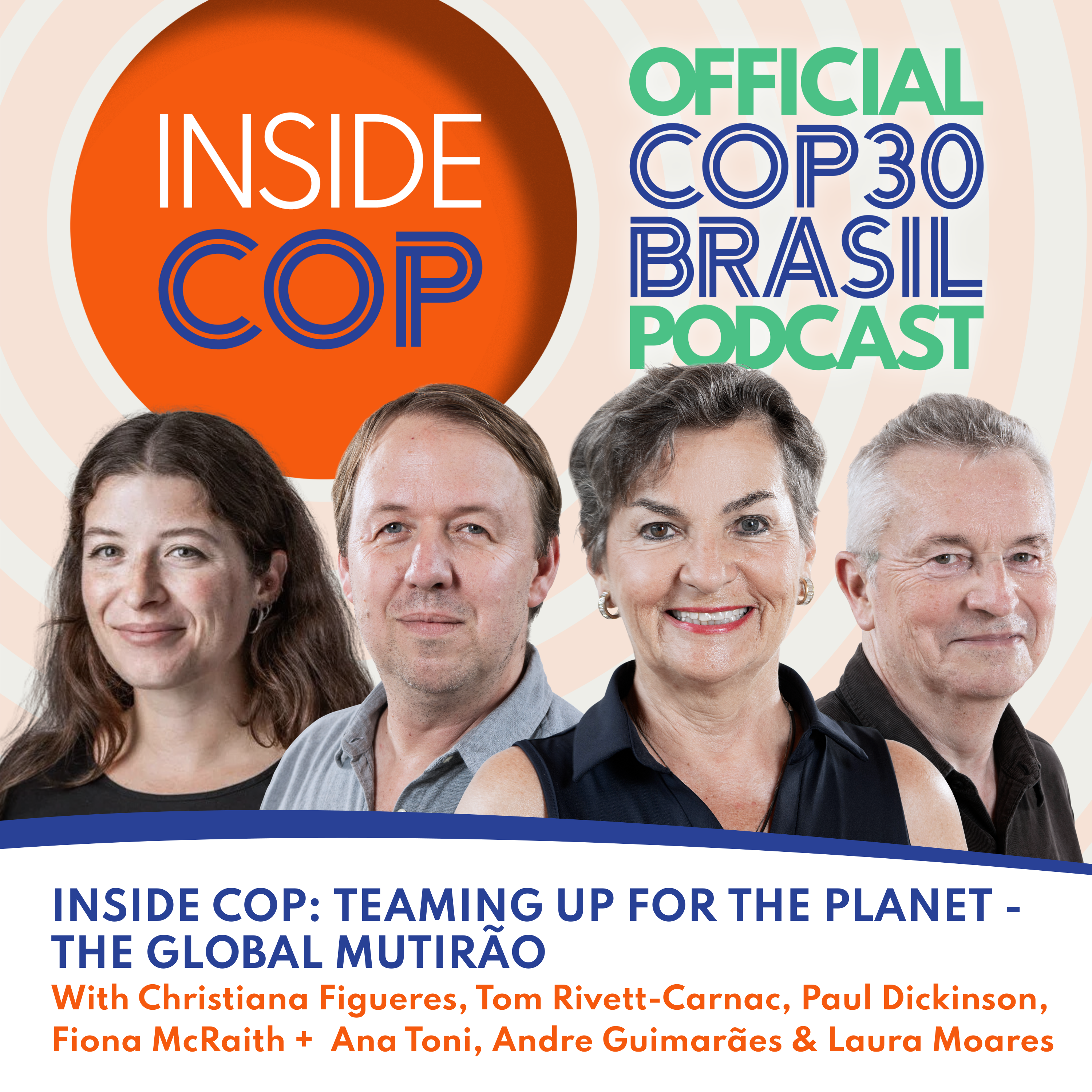
.png)
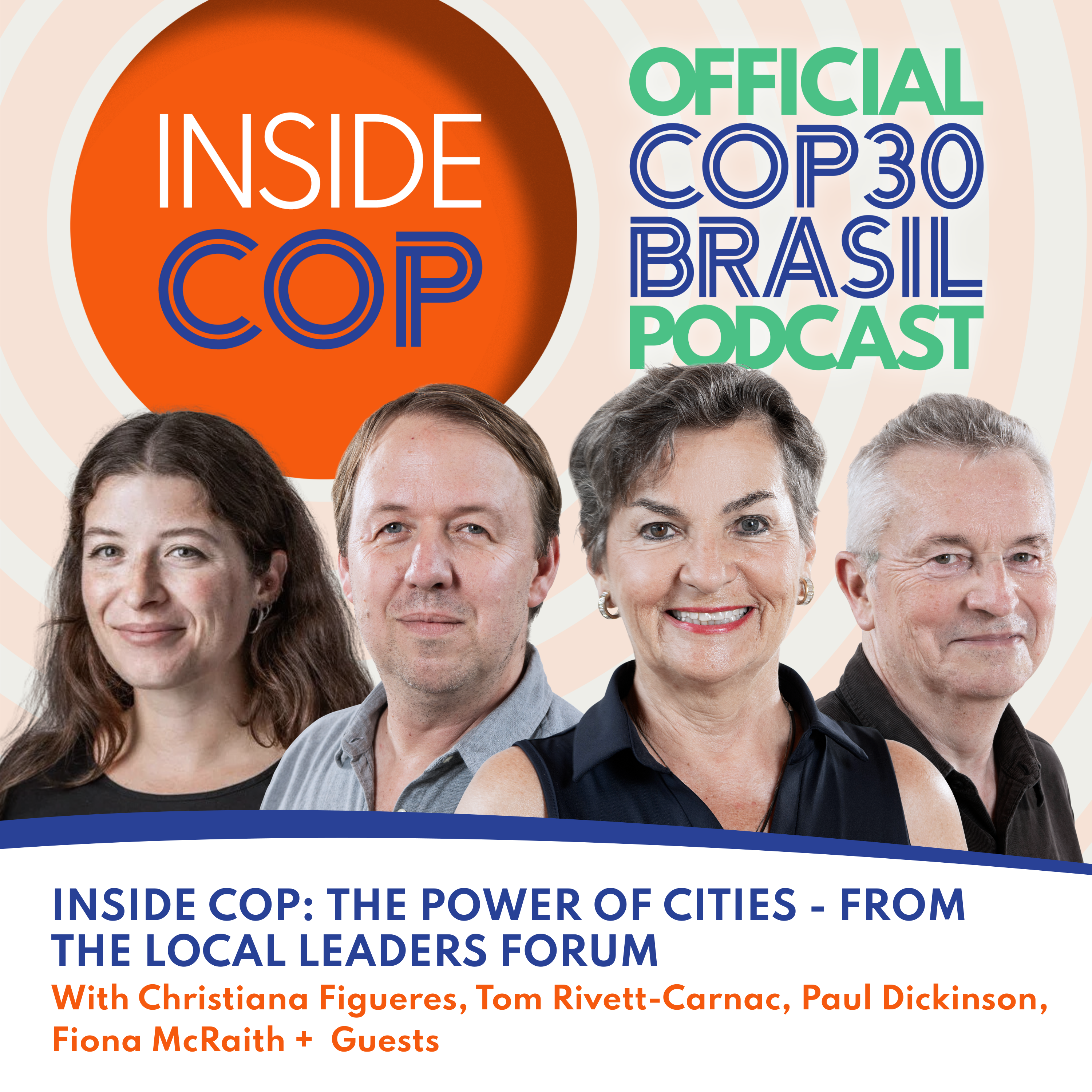
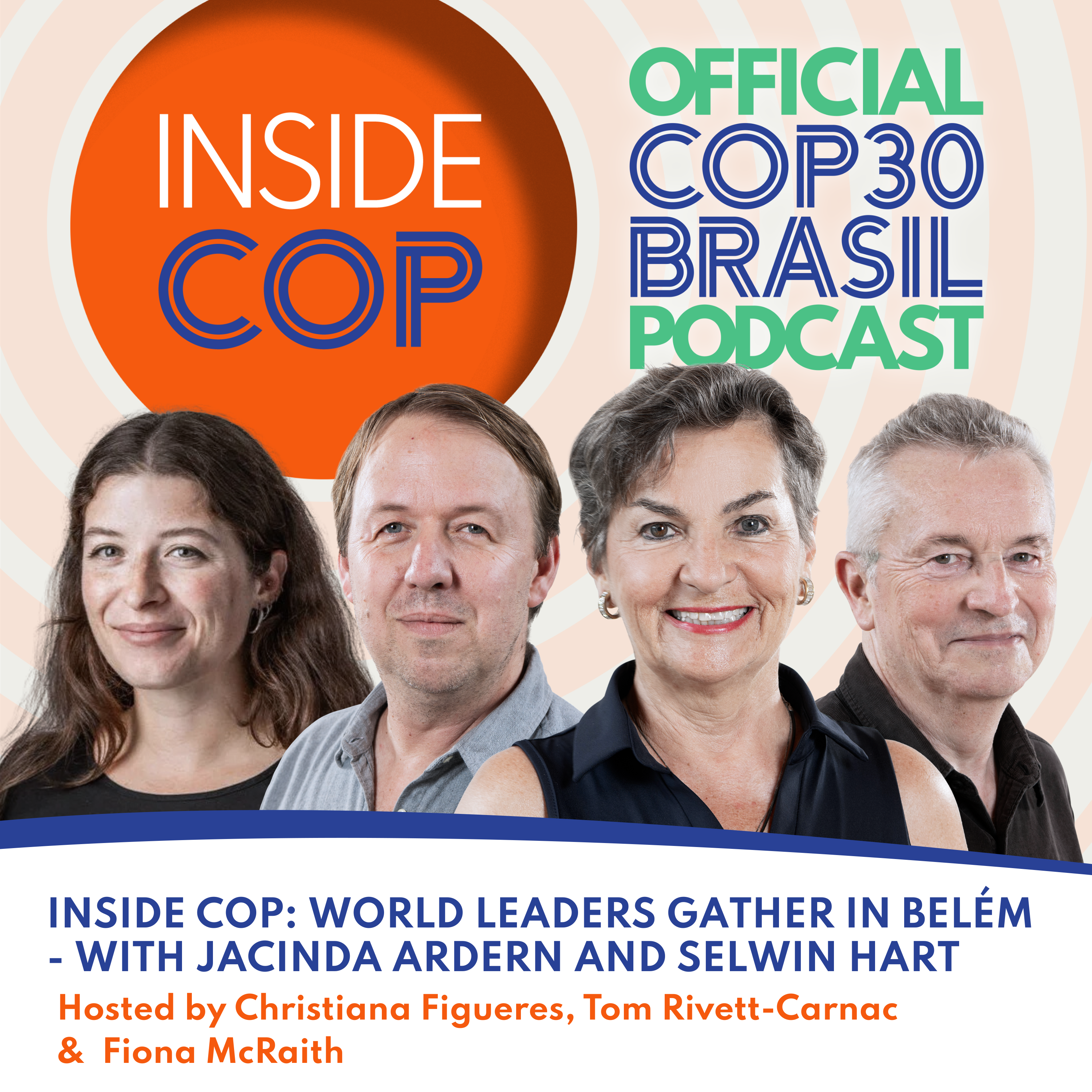
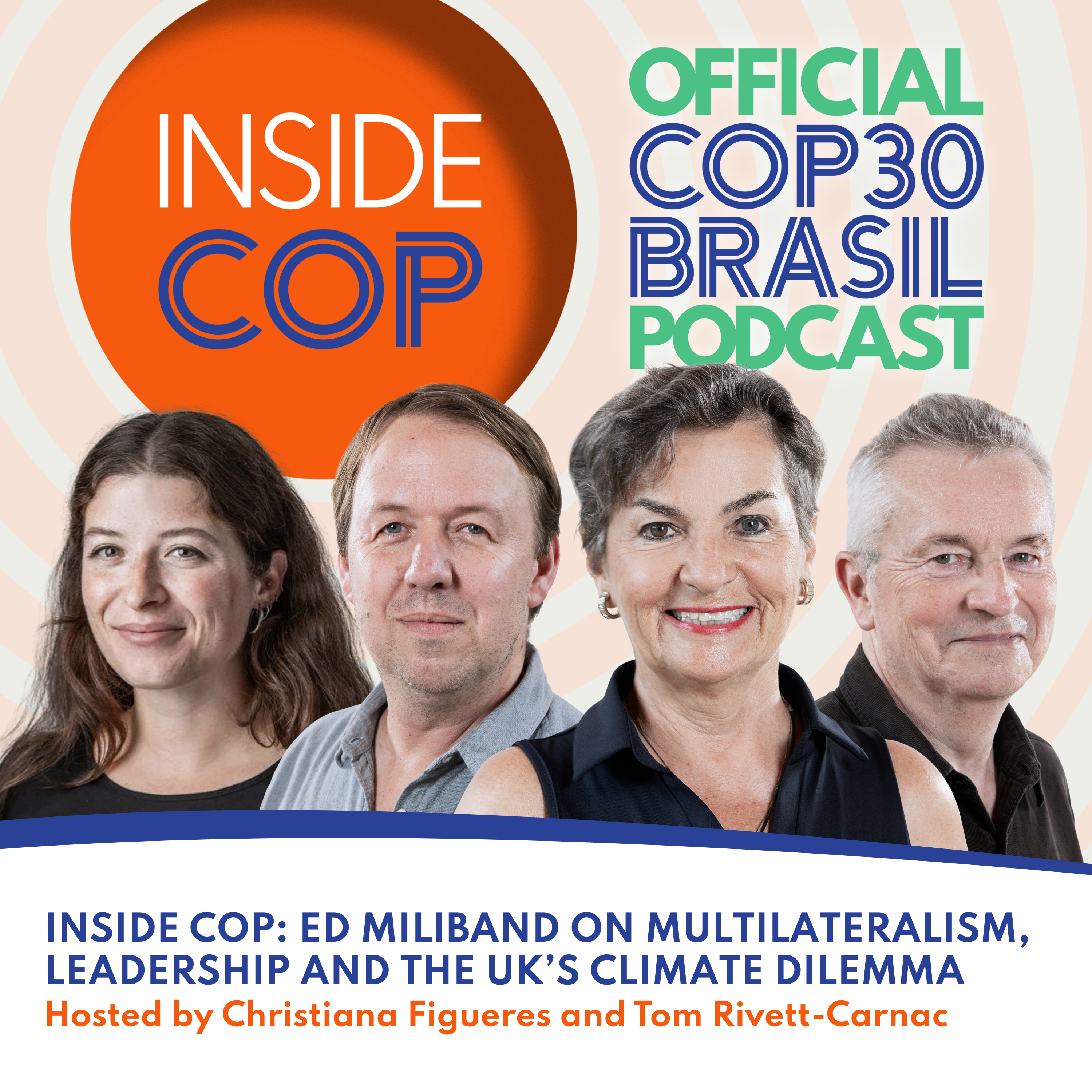
.png)
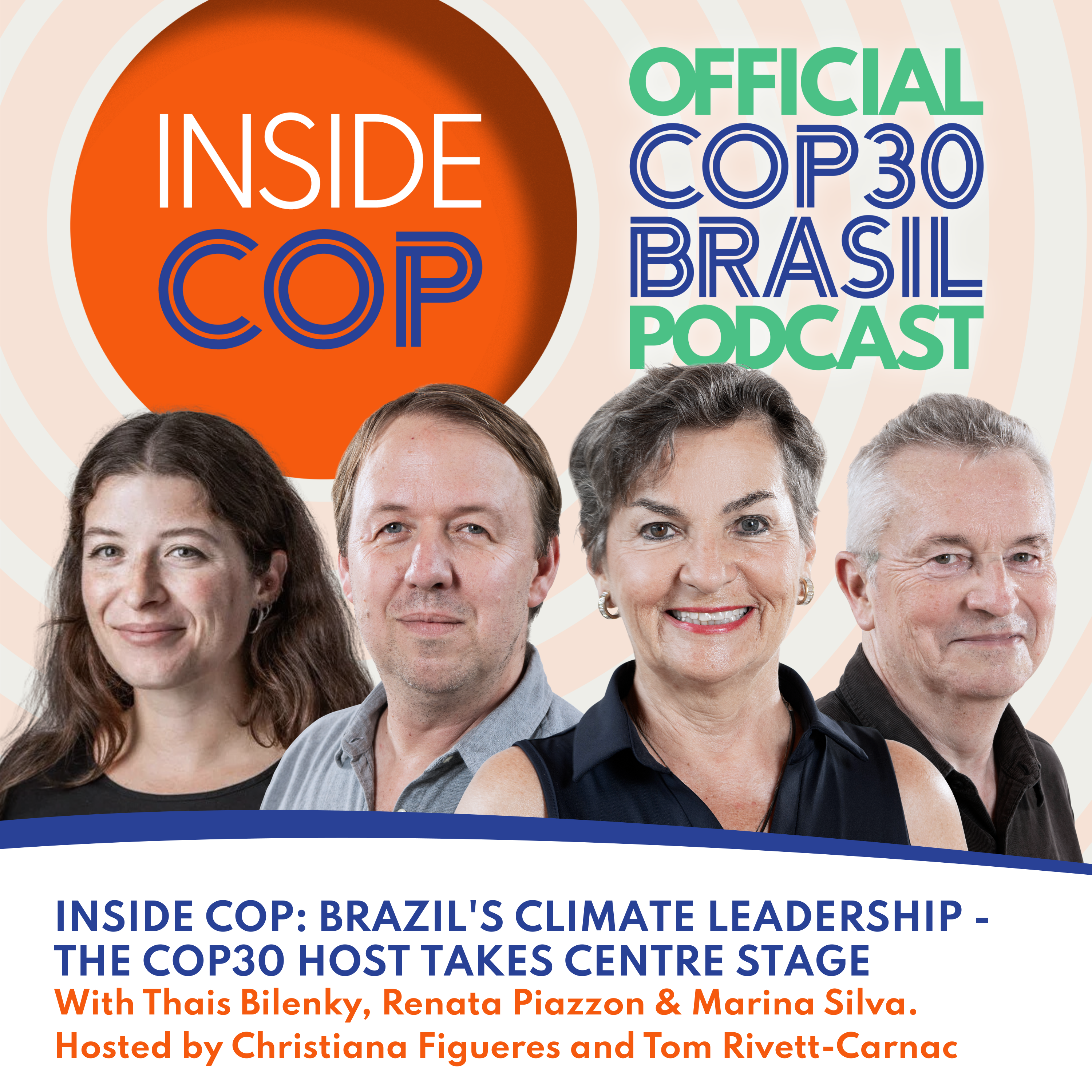
.png)
.png)
.png)
.png)
.png)
.png)
.png)
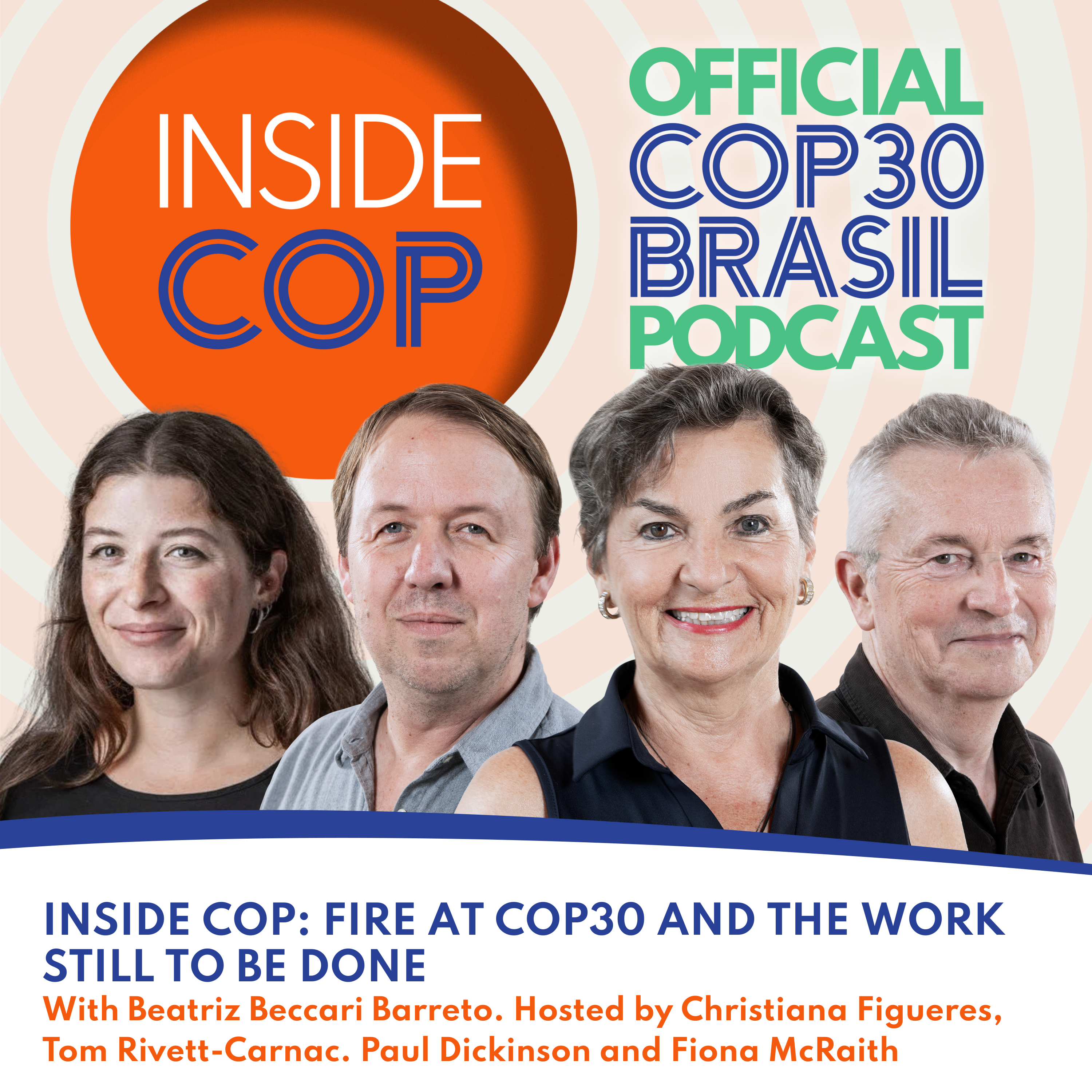

.png)
.png)
